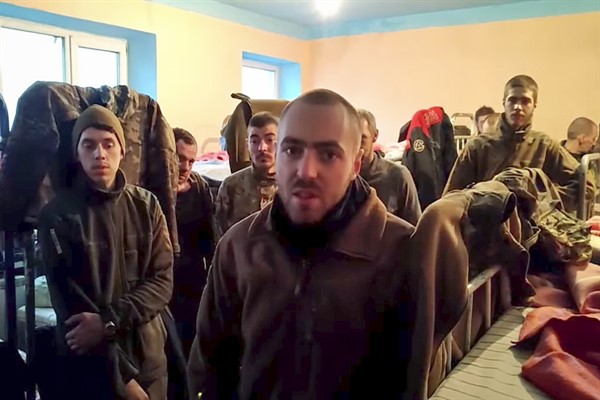On Wednesday, more than 250 Ukrainian soldiers who were hiding out in a steel plant in Mariupol surrendered to Russian forces and were swiftly detained. Speculation about what will happen to them has been intense, given Russia’s poor adherence to the Geneva Conventions since its troops invaded Ukraine in February. According to Reuters, at least one Russian negotiator involved in talks with Ukraine has called for the prisoners to be executed, an act that is expressly prohibited by the Geneva Conventions. Ukrainian officials, as well as the soldiers’ families, have expressed hopes for a prisoner exchange.
Another possibility, though, is that the detained fighters will be neither exchanged nor held without charge as prisoners of war, but instead will be declared “terrorists” by a Russian court and put on trial as such. The Defense Committee of Russia’s State Duma, its lower legislature, is now pushing a draft resolution to prevent the exchange of “Nazi criminals,” a term that has frequently been used by Russian politicians to describe the entire Ukrainian resistance. The country’s prosecutor-general has requested that the Russian Supreme Court rule on whether the Azov Battalion, a far-right unit from Mariupol, should be considered a “terrorist” group. According to the Russian state-owned news agency TASS, if the court does apply that label to the Azov Battalion, it would be outlawed from operating on Russian territory, and its members—including presumably many of the detained fighters from Mariupol—could face jail time or fines.
Would trying prisoners of war as terrorists, or refusing to exchange them based on their far-right political ideology, be consistent with the Geneva Conventions? In fact, prisoner exchanges are not regulated under the conventions, which instead simply state that “hostage-taking is prohibited.” This clause implies that prisoners cannot be treated as commodities to be exchanged for concessions, but must be detained for the sole purpose of being kept off the battlefield, with allowances for the early repatriation of those unable to contribute to the war effort due to illness or disability.

